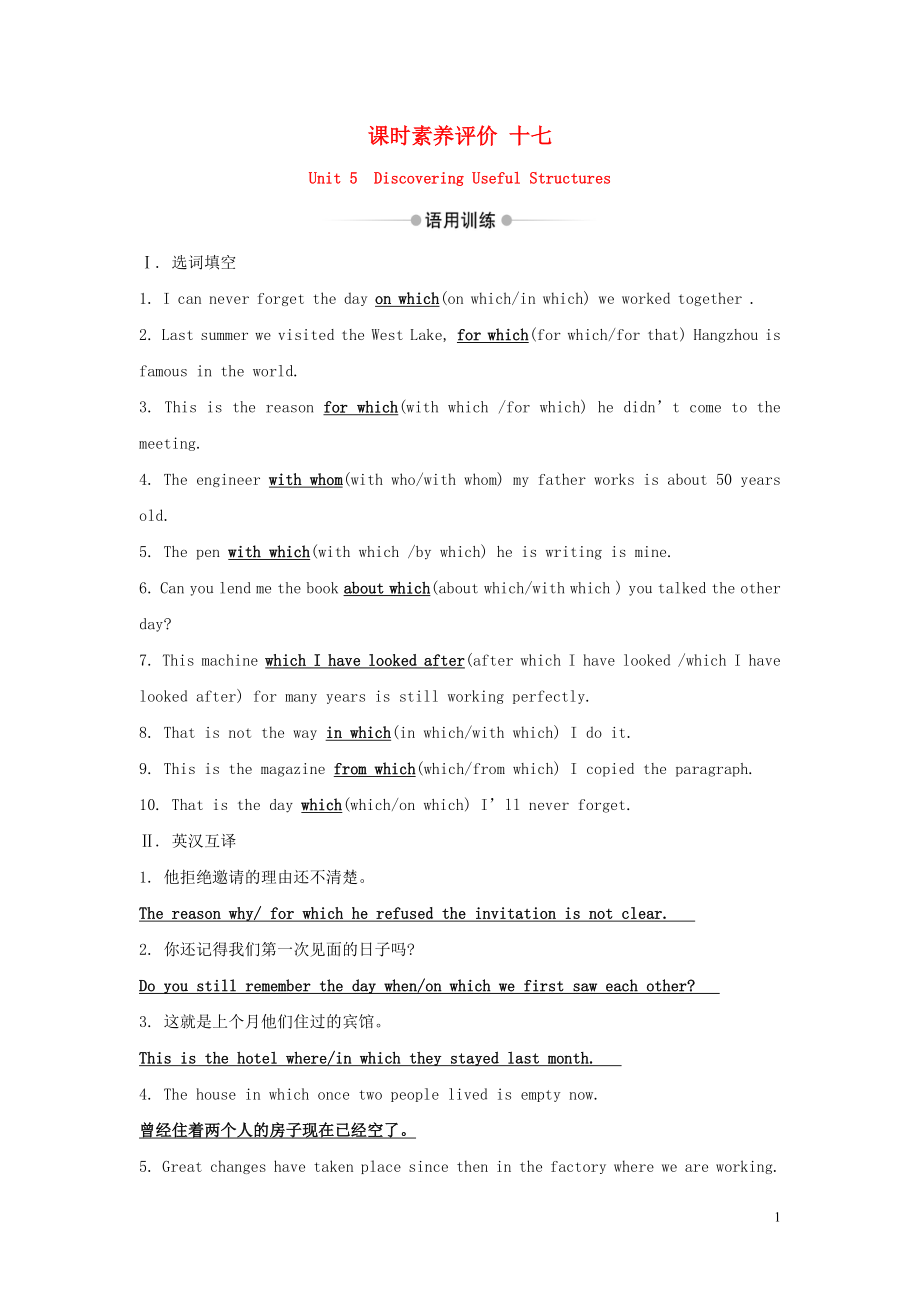《2020版新教材高中英語 課時素養(yǎng)評價 十七 Unit 5 Discovering Useful Structures(含解析)新人教版必修1》由會員分享��,可在線閱讀����,更多相關(guān)《2020版新教材高中英語 課時素養(yǎng)評價 十七 Unit 5 Discovering Useful Structures(含解析)新人教版必修1(5頁珍藏版)》請在裝配圖網(wǎng)上搜索。
1��、課時素養(yǎng)評價 十七
Unit 5 Discovering Useful Structures
Ⅰ. 選詞填空
1. I can never forget the day on which(on which/in which) we worked together . ?
2. Last summer we visited the West Lake, for which(for which/for that) Hangzhou is famous in the world. ?
3. This is the reason for which(with which /for whi
2�、ch) he didn’t come to the meeting. ?
4. The engineer with whom(with who/with whom) my father works is about 50 years old. ?
5. The pen with which(with which /by which) he is writing is mine. ?
6. Can you lend me the book about which(about which/with which ) you talked the other day? ?
7. This ma
3、chine which I have looked after(after which I have looked /which I have looked after) for many years is still working perfectly. ?
8. That is not the way in which(in which/with which) I do it. ?
9. This is the magazine from which(which/from which) I copied the paragraph. ?
10. That is the day whi
4�、ch(which/on which) I’ll never forget.
Ⅱ. 英漢互譯
1. 他拒絕邀請的理由還不清楚。
The reason why/ for which he refused the invitation is not clear. ?
2. 你還記得我們第一次見面的日子嗎?
Do you still remember the day when/on which we first saw each other? ?
3. 這就是上個月他們住過的賓館��。
This is the hotel where/in which they stayed last m
5�、onth. ?
4. The house in which once two people lived is empty now.
曾經(jīng)住著兩個人的房子現(xiàn)在已經(jīng)空了��。
5. Great changes have taken place since then in the factory where we are working.
從那時起, 我們工作過的工廠發(fā)生了很大變化�。
6. That is the place about which they just now talked.
那就是他們剛才討論的地方����。
句型轉(zhuǎn)換
1. The file reminded me of
6、 the hard times when we had nothing to eat.
→The file reminded me of the hard times in which we had nothing to eat.
2. The reason why he was late for the lecture is that he got up late this morning.
→The reason for which he was late for the lecture is that he got up late this morning.
3. The
7���、 farm where I once lived has a great effect on my life.
→The farm on which I once lived has a great effect on my life. ?
Ⅰ. 完形填空
People from Great Britain brought the English language to North America in the 16th and 17th centuries.
And in the 1 300 years, there were 2 many ch
8���、anges in 3 places that now people can 4 tell an English person 5 an American in the way he or she speaks. ?
Many old words 6 in England but were kept in America. For example, 300 years ago people in Great Britain got their water from something they called either a “faucet”, a “spigot”or a
9、“tap”. All these words are 7 heard in different parts of America, but only “tap” is still common in 8 . Americans often made up new words or changed old 9 . “Corn”is one kind of plant in America and 10 in England. ?
Also, over the last three centuries, the English language has 11 thousa
10���、nds of new words for things that weren’t known 12 . And often, American and English people used 13 names for them. A tin can is called “tin” for short in English, but a “can” in America. The word “radio” is 14 all over the world, including America. But many English people call it a “wireless”.
11����、 And almost anything having something to do 15 cars, railroads, etc. 16 different names in British and American English. ?
But now American and British English may be growing closer together. One 17 is the large number of American speeches that British people hear daily in movies on telev
12����、ision or 18 travelers. ?
19 this, Americans seem to be influencing (影響)the British more or less. So some day, English may even be the 20 on both sides of the Atlantic. ?
【文章大意】本文介紹了英式英語和美式英語的發(fā)展和區(qū)別。
1. A. following B. recent C. old D. last
【解析】選A��。邏輯推理題。第一句提到了英國人在16世紀和17世紀把英語帶到了北
13�、美��。因此, 此處用in the following 300 years表示在接下來的300年里����。故選A。
2. A. such B. too C. so D. great
【解析】選C����。固定句式題。so. . . that. . . 是固定句式, 意為“如此……以至于……”��。故選C��。
3. A. either B. both C. neither D. too
【解析】選B��。邏輯推理題���。上文提到了兩個地點Great Britain和North America, 且此處表示肯定的含義, 應(yīng)用both����。故選B�。
4. A. hardly B. f
14、inally C. clearly D. easily
【解析】選D。邏輯推理題��。由于發(fā)生了很大的變化, 人們應(yīng)該很容易分辨出美國人和英國人����。故選D。
5. A. with B. from C. to D. of
【解析】選B��。固定搭配題����。tell. . . from. . . 意為“把……和……區(qū)分開”。故選B��。
6. A. disappeared B. appeared C. spoke D. took
【解析】選A�。邏輯推理題。根據(jù)空后but were kept in America可知, disappeared與were kept相對應(yīng)��。
15����、故選A。
7. A. yet B. hardly C. also D. still
【解析】選D�。邏輯推理題。此句是對but were kept in America的進一步說明�。故選D�。
8. A. America B. China C. England D. British
【解析】選C����。邏輯推理題。由but前的in different parts of America可知, 此處應(yīng)該選擇England��。
9. A. word B. forms C. ones D. ways
【解析】選C���。邏輯推理題。由前面的new words 可知
16��、此處應(yīng)該用old words, 用ones代替words���。故選C���。
10. A. another B. other
C. others D. other’s
【解析】選A。邏輯推理題���。由上文的one kind of plant可知, 此處應(yīng)指另外一種植物����。故選A��。
11. A. found B. added
C. covered D. discovered
【解析】選B。詞匯辨析題����。found發(fā)現(xiàn); added增加; covered覆蓋; discovered發(fā)現(xiàn)。句意: 在近三個世紀以來, 要想表達以前不知道的事物, 就必須“增加”詞匯, 因此應(yīng)該用a
17�、dded。故選B��。
12. A. anywhere B. after C. before D. once
【解析】選C�。邏輯推理題。增加的詞匯用來表示“以前”不知道的事物��。故選C���。
13. A. new B. short
C. different D. surprising
【解析】選C���。邏輯推理題。從后面的兩句話可知, 此處是指用“不同的”詞匯指代同一物體��。故選C�。
14. A. produced B. made C. developed D. used
【解析】選D。詞匯辨析題�。produced生產(chǎn), 制造; made制造; develop
18、ed發(fā)展; used使用���。既然“radio”是一個詞, 它應(yīng)該被世界各地的人們所“使用”���。故選D��。
15. A. to B. on C. with D. from
【解析】選C��。固定句式題���。have sth. to do with是固定句式, 意為: 與……有關(guān)����。故選C。
16. A. has B. gives C. calls D. finds
【解析】選A����。邏輯推理題。句意: 與汽車��、鐵路有關(guān)的東西都“有”不同的名字���。故選A����。
17. A. thing B. cause
C. belief D. expression
【解析】選A。詞匯辨析
19��、題��。thing事情, 情況; cause原因, 事業(yè); belief信念, 相信; expression詞語, 表達�。此處用來表明美式英語和英式英語越來越接近。故選A�。
18. A. from B. in C. on D. to
【解析】選A。邏輯推理題����。與前面的in movies on television并列, 應(yīng)該用from travelers, 表示“游客所講的語言”。故選A����。
19. A. For B. Instead of
C. Besides D. Because of
【解析】選D。邏輯推理題��。從后半句可以看出, 正是由于上句話中所提到的原因才得出結(jié)論: 美國人似乎對英國人產(chǎn)生了影響�。故選D。
20. A. different B. fluent C. same D. useful
【解析】選C�。邏輯推理題。上文談到美國人對英國人產(chǎn)生了影響, 所以作者最后說“將來有一天大西洋兩岸的英語可能會一樣”���。
5
 2020版新教材高中英語 課時素養(yǎng)評價 十七 Unit 5 Discovering Useful Structures(含解析)新人教版必修1
2020版新教材高中英語 課時素養(yǎng)評價 十七 Unit 5 Discovering Useful Structures(含解析)新人教版必修1

